Pro-Choice: Detailed Research Methodology and Ethical Considerations
VerifiedAdded on 2022/11/13
|7
|1376
|271
Report
AI Summary
This report examines the research methodology employed by Pro-Choice, a New Zealand startup focused on protein supplement vending machines. The study utilizes a mixed methodology approach, integrating both qualitative and quantitative research methods. Qualitative research involves interviews with gym owners to understand their perspectives, while quantitative research uses surveys distributed to gym members to gather statistical data. The report details the data collection methods, including interviews and surveys, along with the sampling strategy of 200 gym members and 50 gym owners. The report emphasizes research ethics, outlining measures to ensure participant confidentiality, informed consent, and non-discrimination. It highlights the advantages of ethical practices in research, such as preventing deviations from norms and ensuring the study's authenticity and transparency. The report references key academic sources to support the research design and ethical considerations.
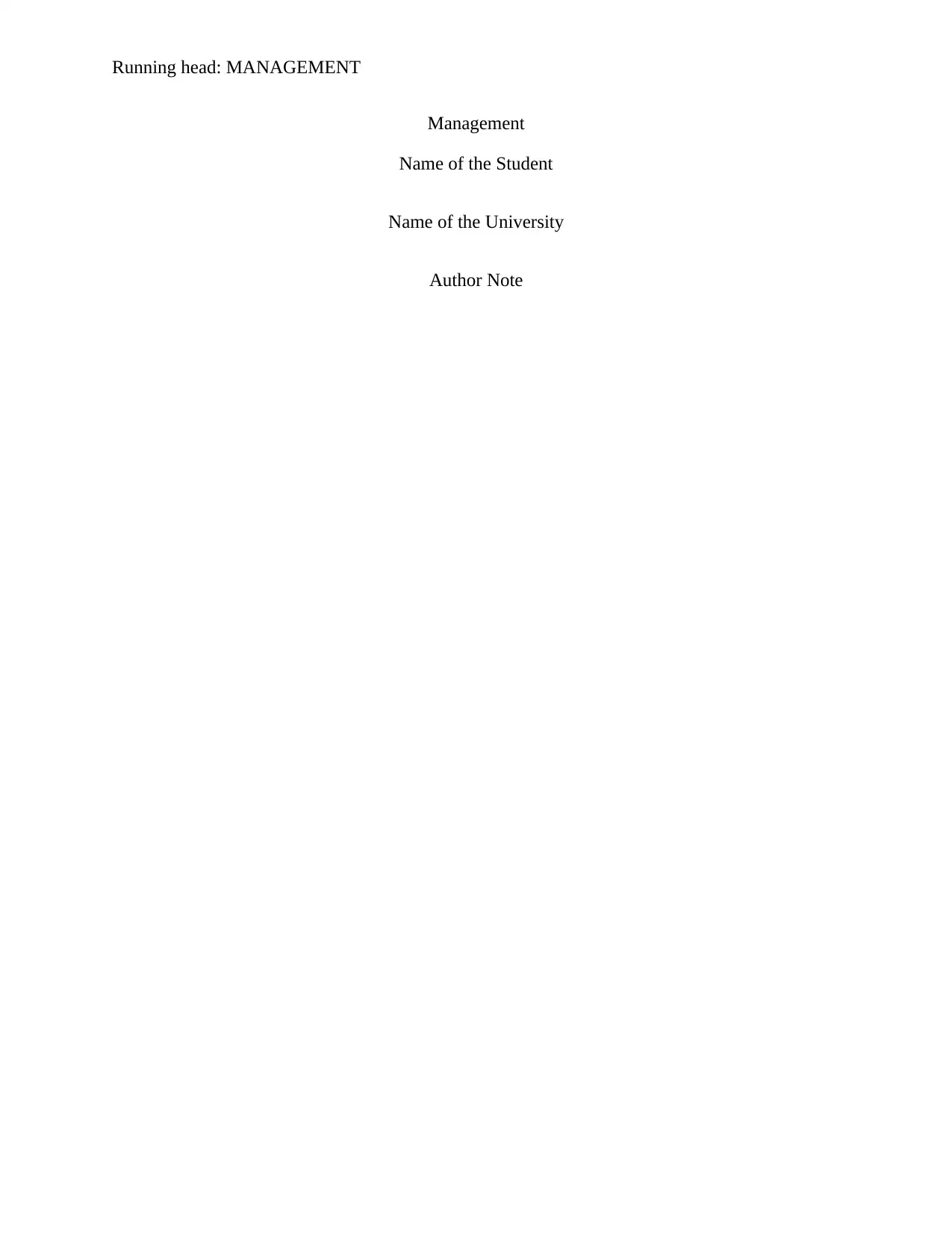
Running head: MANAGEMENT
Management
Name of the Student
Name of the University
Author Note
Management
Name of the Student
Name of the University
Author Note
Paraphrase This Document
Need a fresh take? Get an instant paraphrase of this document with our AI Paraphraser
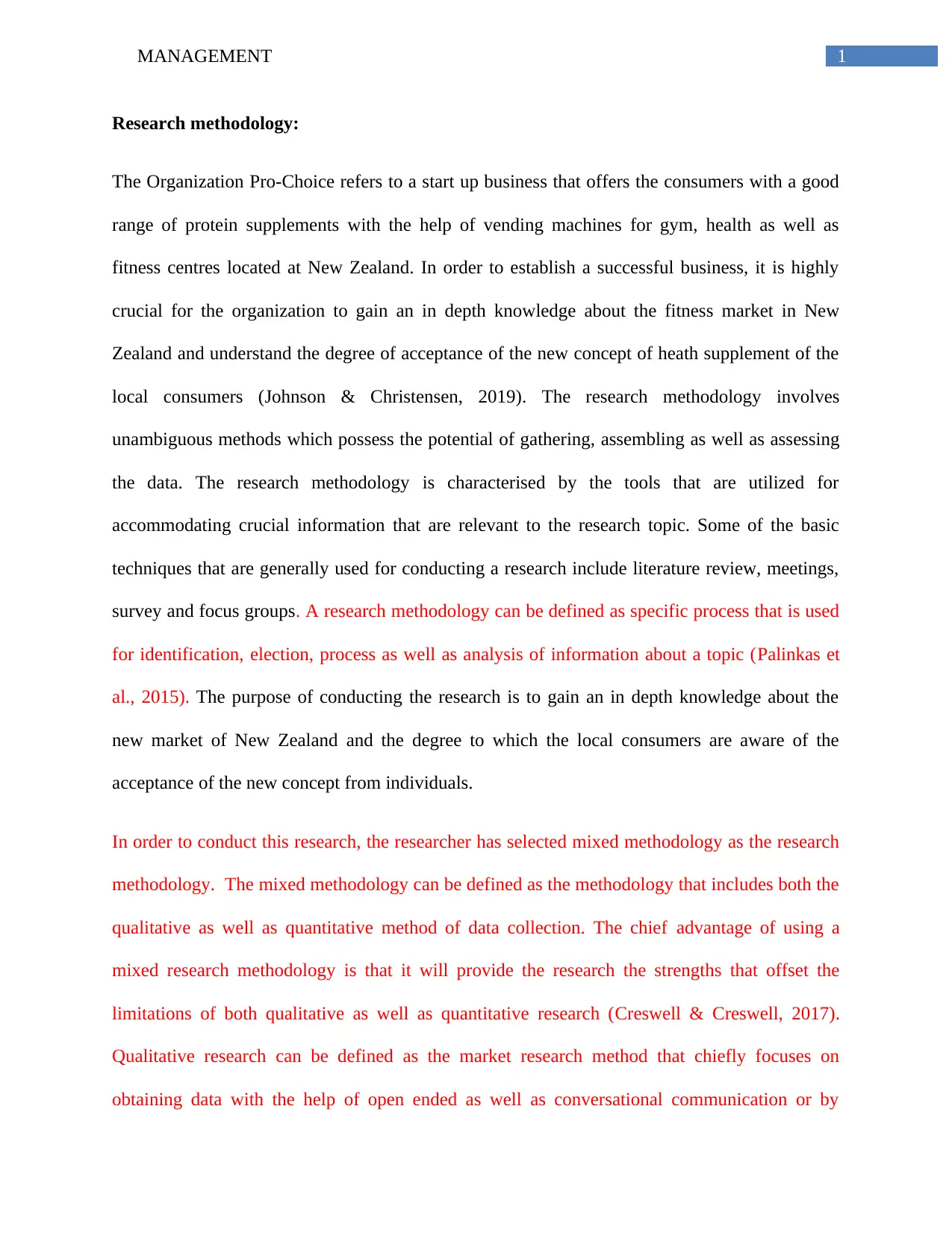
1MANAGEMENT
Research methodology:
The Organization Pro-Choice refers to a start up business that offers the consumers with a good
range of protein supplements with the help of vending machines for gym, health as well as
fitness centres located at New Zealand. In order to establish a successful business, it is highly
crucial for the organization to gain an in depth knowledge about the fitness market in New
Zealand and understand the degree of acceptance of the new concept of heath supplement of the
local consumers (Johnson & Christensen, 2019). The research methodology involves
unambiguous methods which possess the potential of gathering, assembling as well as assessing
the data. The research methodology is characterised by the tools that are utilized for
accommodating crucial information that are relevant to the research topic. Some of the basic
techniques that are generally used for conducting a research include literature review, meetings,
survey and focus groups. A research methodology can be defined as specific process that is used
for identification, election, process as well as analysis of information about a topic (Palinkas et
al., 2015). The purpose of conducting the research is to gain an in depth knowledge about the
new market of New Zealand and the degree to which the local consumers are aware of the
acceptance of the new concept from individuals.
In order to conduct this research, the researcher has selected mixed methodology as the research
methodology. The mixed methodology can be defined as the methodology that includes both the
qualitative as well as quantitative method of data collection. The chief advantage of using a
mixed research methodology is that it will provide the research the strengths that offset the
limitations of both qualitative as well as quantitative research (Creswell & Creswell, 2017).
Qualitative research can be defined as the market research method that chiefly focuses on
obtaining data with the help of open ended as well as conversational communication or by
Research methodology:
The Organization Pro-Choice refers to a start up business that offers the consumers with a good
range of protein supplements with the help of vending machines for gym, health as well as
fitness centres located at New Zealand. In order to establish a successful business, it is highly
crucial for the organization to gain an in depth knowledge about the fitness market in New
Zealand and understand the degree of acceptance of the new concept of heath supplement of the
local consumers (Johnson & Christensen, 2019). The research methodology involves
unambiguous methods which possess the potential of gathering, assembling as well as assessing
the data. The research methodology is characterised by the tools that are utilized for
accommodating crucial information that are relevant to the research topic. Some of the basic
techniques that are generally used for conducting a research include literature review, meetings,
survey and focus groups. A research methodology can be defined as specific process that is used
for identification, election, process as well as analysis of information about a topic (Palinkas et
al., 2015). The purpose of conducting the research is to gain an in depth knowledge about the
new market of New Zealand and the degree to which the local consumers are aware of the
acceptance of the new concept from individuals.
In order to conduct this research, the researcher has selected mixed methodology as the research
methodology. The mixed methodology can be defined as the methodology that includes both the
qualitative as well as quantitative method of data collection. The chief advantage of using a
mixed research methodology is that it will provide the research the strengths that offset the
limitations of both qualitative as well as quantitative research (Creswell & Creswell, 2017).
Qualitative research can be defined as the market research method that chiefly focuses on
obtaining data with the help of open ended as well as conversational communication or by
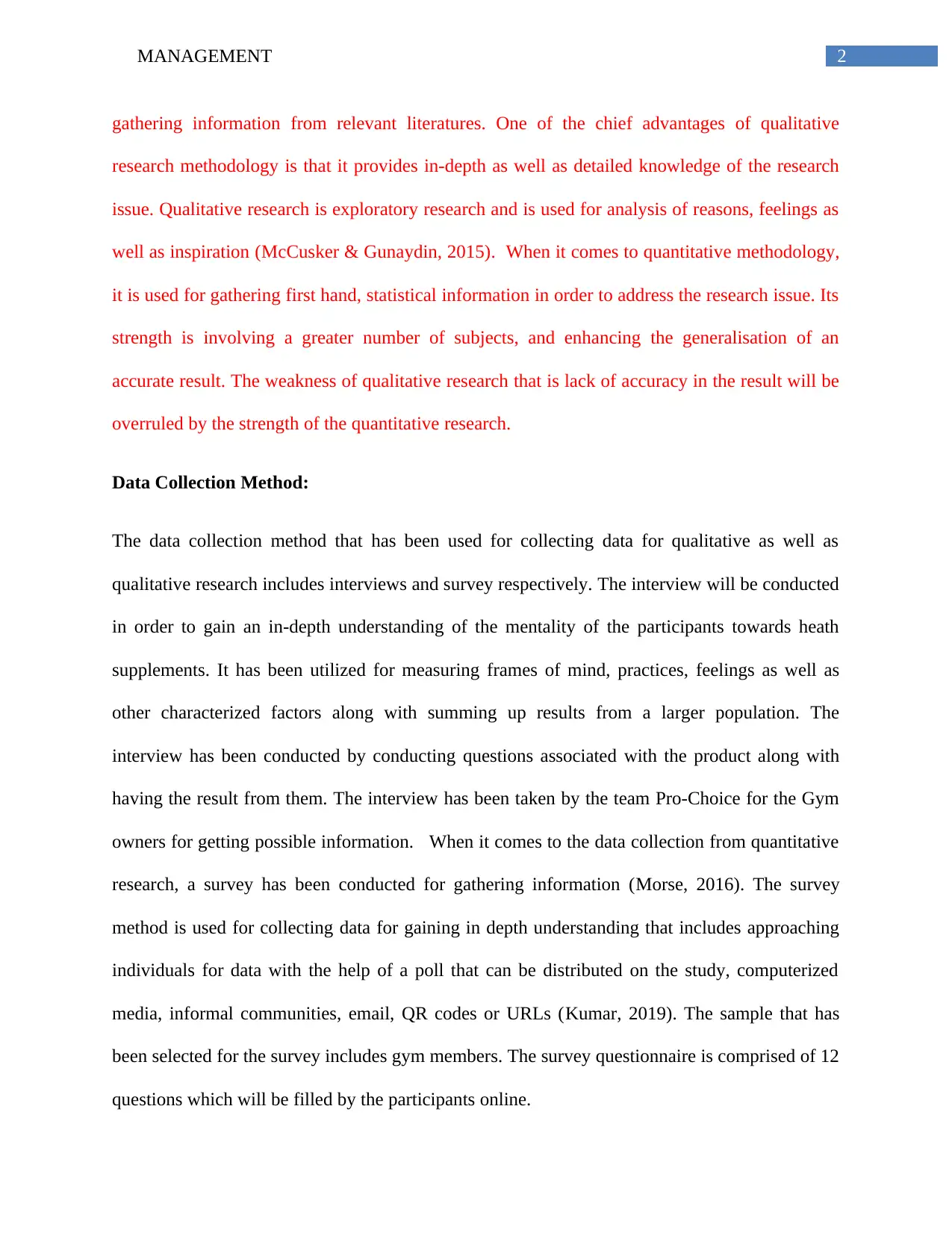
2MANAGEMENT
gathering information from relevant literatures. One of the chief advantages of qualitative
research methodology is that it provides in-depth as well as detailed knowledge of the research
issue. Qualitative research is exploratory research and is used for analysis of reasons, feelings as
well as inspiration (McCusker & Gunaydin, 2015). When it comes to quantitative methodology,
it is used for gathering first hand, statistical information in order to address the research issue. Its
strength is involving a greater number of subjects, and enhancing the generalisation of an
accurate result. The weakness of qualitative research that is lack of accuracy in the result will be
overruled by the strength of the quantitative research.
Data Collection Method:
The data collection method that has been used for collecting data for qualitative as well as
qualitative research includes interviews and survey respectively. The interview will be conducted
in order to gain an in-depth understanding of the mentality of the participants towards heath
supplements. It has been utilized for measuring frames of mind, practices, feelings as well as
other characterized factors along with summing up results from a larger population. The
interview has been conducted by conducting questions associated with the product along with
having the result from them. The interview has been taken by the team Pro-Choice for the Gym
owners for getting possible information. When it comes to the data collection from quantitative
research, a survey has been conducted for gathering information (Morse, 2016). The survey
method is used for collecting data for gaining in depth understanding that includes approaching
individuals for data with the help of a poll that can be distributed on the study, computerized
media, informal communities, email, QR codes or URLs (Kumar, 2019). The sample that has
been selected for the survey includes gym members. The survey questionnaire is comprised of 12
questions which will be filled by the participants online.
gathering information from relevant literatures. One of the chief advantages of qualitative
research methodology is that it provides in-depth as well as detailed knowledge of the research
issue. Qualitative research is exploratory research and is used for analysis of reasons, feelings as
well as inspiration (McCusker & Gunaydin, 2015). When it comes to quantitative methodology,
it is used for gathering first hand, statistical information in order to address the research issue. Its
strength is involving a greater number of subjects, and enhancing the generalisation of an
accurate result. The weakness of qualitative research that is lack of accuracy in the result will be
overruled by the strength of the quantitative research.
Data Collection Method:
The data collection method that has been used for collecting data for qualitative as well as
qualitative research includes interviews and survey respectively. The interview will be conducted
in order to gain an in-depth understanding of the mentality of the participants towards heath
supplements. It has been utilized for measuring frames of mind, practices, feelings as well as
other characterized factors along with summing up results from a larger population. The
interview has been conducted by conducting questions associated with the product along with
having the result from them. The interview has been taken by the team Pro-Choice for the Gym
owners for getting possible information. When it comes to the data collection from quantitative
research, a survey has been conducted for gathering information (Morse, 2016). The survey
method is used for collecting data for gaining in depth understanding that includes approaching
individuals for data with the help of a poll that can be distributed on the study, computerized
media, informal communities, email, QR codes or URLs (Kumar, 2019). The sample that has
been selected for the survey includes gym members. The survey questionnaire is comprised of 12
questions which will be filled by the participants online.
⊘ This is a preview!⊘
Do you want full access?
Subscribe today to unlock all pages.

Trusted by 1+ million students worldwide
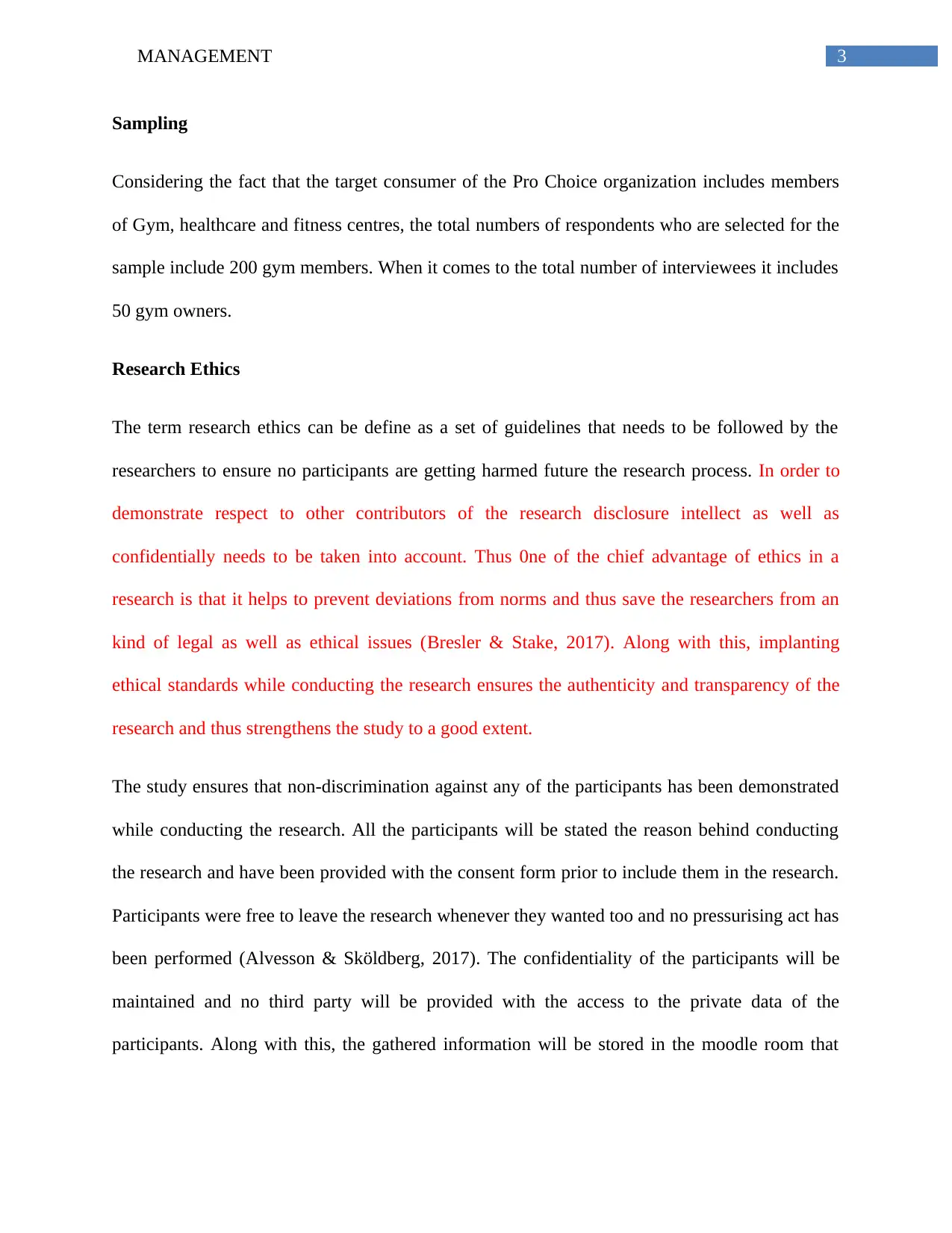
3MANAGEMENT
Sampling
Considering the fact that the target consumer of the Pro Choice organization includes members
of Gym, healthcare and fitness centres, the total numbers of respondents who are selected for the
sample include 200 gym members. When it comes to the total number of interviewees it includes
50 gym owners.
Research Ethics
The term research ethics can be define as a set of guidelines that needs to be followed by the
researchers to ensure no participants are getting harmed future the research process. In order to
demonstrate respect to other contributors of the research disclosure intellect as well as
confidentially needs to be taken into account. Thus 0ne of the chief advantage of ethics in a
research is that it helps to prevent deviations from norms and thus save the researchers from an
kind of legal as well as ethical issues (Bresler & Stake, 2017). Along with this, implanting
ethical standards while conducting the research ensures the authenticity and transparency of the
research and thus strengthens the study to a good extent.
The study ensures that non-discrimination against any of the participants has been demonstrated
while conducting the research. All the participants will be stated the reason behind conducting
the research and have been provided with the consent form prior to include them in the research.
Participants were free to leave the research whenever they wanted too and no pressurising act has
been performed (Alvesson & Sköldberg, 2017). The confidentiality of the participants will be
maintained and no third party will be provided with the access to the private data of the
participants. Along with this, the gathered information will be stored in the moodle room that
Sampling
Considering the fact that the target consumer of the Pro Choice organization includes members
of Gym, healthcare and fitness centres, the total numbers of respondents who are selected for the
sample include 200 gym members. When it comes to the total number of interviewees it includes
50 gym owners.
Research Ethics
The term research ethics can be define as a set of guidelines that needs to be followed by the
researchers to ensure no participants are getting harmed future the research process. In order to
demonstrate respect to other contributors of the research disclosure intellect as well as
confidentially needs to be taken into account. Thus 0ne of the chief advantage of ethics in a
research is that it helps to prevent deviations from norms and thus save the researchers from an
kind of legal as well as ethical issues (Bresler & Stake, 2017). Along with this, implanting
ethical standards while conducting the research ensures the authenticity and transparency of the
research and thus strengthens the study to a good extent.
The study ensures that non-discrimination against any of the participants has been demonstrated
while conducting the research. All the participants will be stated the reason behind conducting
the research and have been provided with the consent form prior to include them in the research.
Participants were free to leave the research whenever they wanted too and no pressurising act has
been performed (Alvesson & Sköldberg, 2017). The confidentiality of the participants will be
maintained and no third party will be provided with the access to the private data of the
participants. Along with this, the gathered information will be stored in the moodle room that
Paraphrase This Document
Need a fresh take? Get an instant paraphrase of this document with our AI Paraphraser
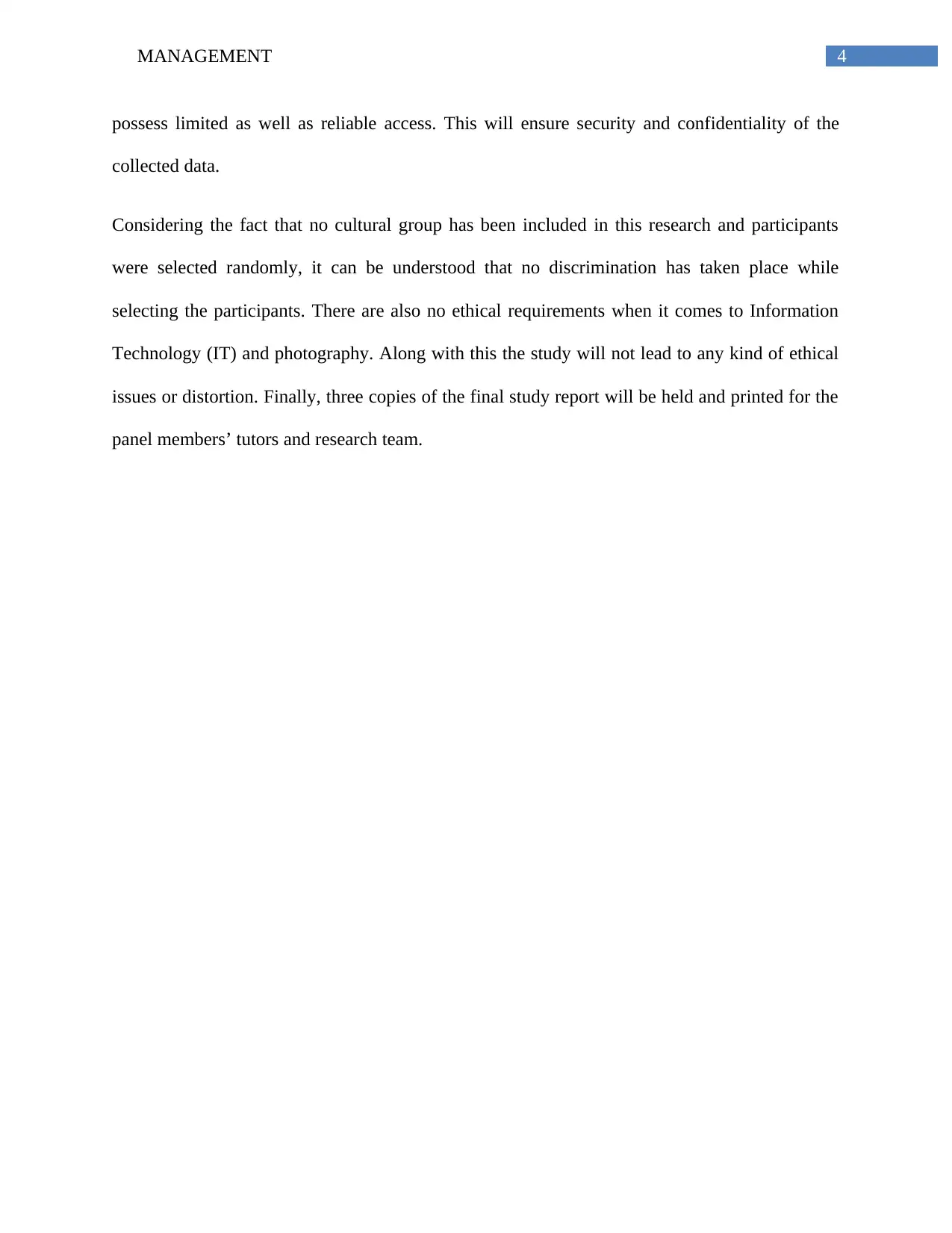
4MANAGEMENT
possess limited as well as reliable access. This will ensure security and confidentiality of the
collected data.
Considering the fact that no cultural group has been included in this research and participants
were selected randomly, it can be understood that no discrimination has taken place while
selecting the participants. There are also no ethical requirements when it comes to Information
Technology (IT) and photography. Along with this the study will not lead to any kind of ethical
issues or distortion. Finally, three copies of the final study report will be held and printed for the
panel members’ tutors and research team.
possess limited as well as reliable access. This will ensure security and confidentiality of the
collected data.
Considering the fact that no cultural group has been included in this research and participants
were selected randomly, it can be understood that no discrimination has taken place while
selecting the participants. There are also no ethical requirements when it comes to Information
Technology (IT) and photography. Along with this the study will not lead to any kind of ethical
issues or distortion. Finally, three copies of the final study report will be held and printed for the
panel members’ tutors and research team.
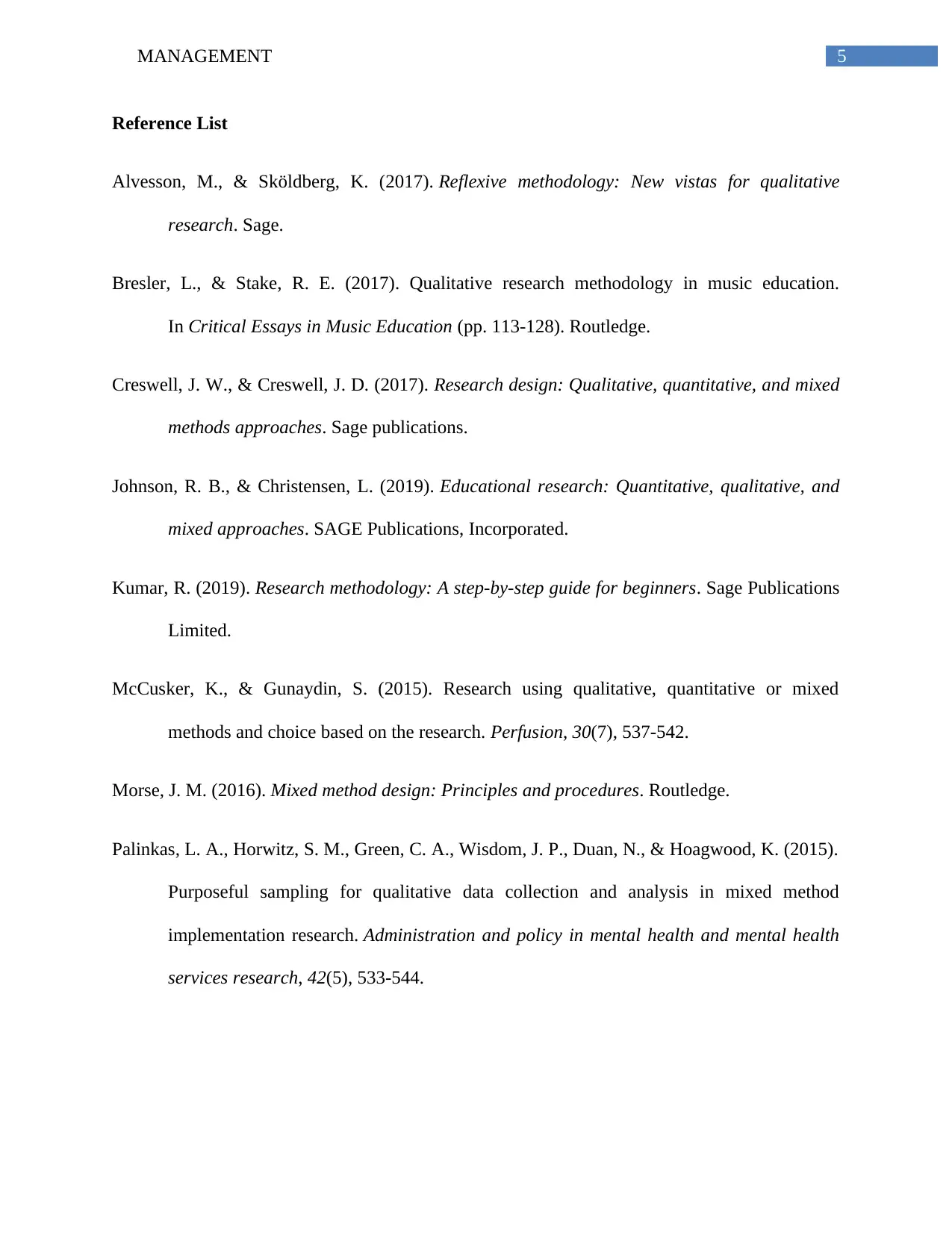
5MANAGEMENT
Reference List
Alvesson, M., & Sköldberg, K. (2017). Reflexive methodology: New vistas for qualitative
research. Sage.
Bresler, L., & Stake, R. E. (2017). Qualitative research methodology in music education.
In Critical Essays in Music Education (pp. 113-128). Routledge.
Creswell, J. W., & Creswell, J. D. (2017). Research design: Qualitative, quantitative, and mixed
methods approaches. Sage publications.
Johnson, R. B., & Christensen, L. (2019). Educational research: Quantitative, qualitative, and
mixed approaches. SAGE Publications, Incorporated.
Kumar, R. (2019). Research methodology: A step-by-step guide for beginners. Sage Publications
Limited.
McCusker, K., & Gunaydin, S. (2015). Research using qualitative, quantitative or mixed
methods and choice based on the research. Perfusion, 30(7), 537-542.
Morse, J. M. (2016). Mixed method design: Principles and procedures. Routledge.
Palinkas, L. A., Horwitz, S. M., Green, C. A., Wisdom, J. P., Duan, N., & Hoagwood, K. (2015).
Purposeful sampling for qualitative data collection and analysis in mixed method
implementation research. Administration and policy in mental health and mental health
services research, 42(5), 533-544.
Reference List
Alvesson, M., & Sköldberg, K. (2017). Reflexive methodology: New vistas for qualitative
research. Sage.
Bresler, L., & Stake, R. E. (2017). Qualitative research methodology in music education.
In Critical Essays in Music Education (pp. 113-128). Routledge.
Creswell, J. W., & Creswell, J. D. (2017). Research design: Qualitative, quantitative, and mixed
methods approaches. Sage publications.
Johnson, R. B., & Christensen, L. (2019). Educational research: Quantitative, qualitative, and
mixed approaches. SAGE Publications, Incorporated.
Kumar, R. (2019). Research methodology: A step-by-step guide for beginners. Sage Publications
Limited.
McCusker, K., & Gunaydin, S. (2015). Research using qualitative, quantitative or mixed
methods and choice based on the research. Perfusion, 30(7), 537-542.
Morse, J. M. (2016). Mixed method design: Principles and procedures. Routledge.
Palinkas, L. A., Horwitz, S. M., Green, C. A., Wisdom, J. P., Duan, N., & Hoagwood, K. (2015).
Purposeful sampling for qualitative data collection and analysis in mixed method
implementation research. Administration and policy in mental health and mental health
services research, 42(5), 533-544.
⊘ This is a preview!⊘
Do you want full access?
Subscribe today to unlock all pages.

Trusted by 1+ million students worldwide

6MANAGEMENT
1 out of 7
Related Documents
Your All-in-One AI-Powered Toolkit for Academic Success.
+13062052269
info@desklib.com
Available 24*7 on WhatsApp / Email
![[object Object]](/_next/static/media/star-bottom.7253800d.svg)
Unlock your academic potential
Copyright © 2020–2026 A2Z Services. All Rights Reserved. Developed and managed by ZUCOL.





